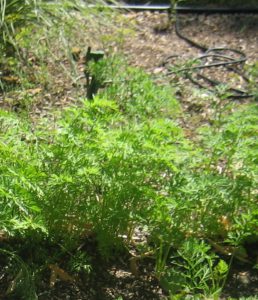 Bolting lettuce is flowering lettuce – but in a sense, that lettuce is also running away. It’s bolting from the growing season when we pick and enjoy it in our salads – and running off to produce seed. The long flower stem headed for the sky and the bitter taste in its leaves say, “I’m done.”
Bolting lettuce is flowering lettuce – but in a sense, that lettuce is also running away. It’s bolting from the growing season when we pick and enjoy it in our salads – and running off to produce seed. The long flower stem headed for the sky and the bitter taste in its leaves say, “I’m done.”
There is nothing we can do to stop Mother Nature from running her course. When plants bolt, it’s time to clean out the plants that are on the downside of the season and plant a new crop of veggies to enjoy in the fall.
Remove lettuce and spinach and sow more seeds that will soon become a fresh cool-season crop. But before yanking them all out of the ground, consider leaving a plant or two that can continue to flower and nourish pollinators still visiting the garden.
At this time of year, other plants such as broccoli will bolt and also herbs such as basil, cilantro and dill. When basil bolts, its leaves may remain flavorful. And unlike lettuce, it is possible to rejuvenate bolting basil. Prune the plant down to about 4-5 inches above the soil. The plant will send out new branches and you will soon have more fresh leaves to harvest. Store the basil you’ve just removed in a vase with water to keep it fresh and usable.
What’s next?
- Anything that is no longer producing should be cleaned out of the garden to make space to plant another crop of cool season veggies for fall harvest.
- While cleaning up, look for aphids as they are still active this time of year. Wash them off plants.
- Be careful what you compost. Avoid putting diseased plant material into the compost pile or when you use that compost, you’ll be putting diseases right back into the garden.
What to plant now:
- Leafy greens: New lettuce that won’t be bitter because it’s a fresh crop – plus spinach and kale
- Radishes
- Peas
- Beans
Water consistently: Keep moisture even and consistent. Large plants such as tomatoes that are 4 ft. tall need moisture to continue growing and producing fruit. Newly planted seeds also need moisture. If seeds dry out, they won’t germinate. That’s why consistent moisture is so important.
Keep planting and look forward to the fall harvest!
Courtesy of ALCC Sustainable Landscape Partners
